Against the odds: Advancing land tenure and synergies at COP16
Our reflection of the UNCCD COP 16
by Frederike Klümper, Jes Weigelt | 2024-12-19
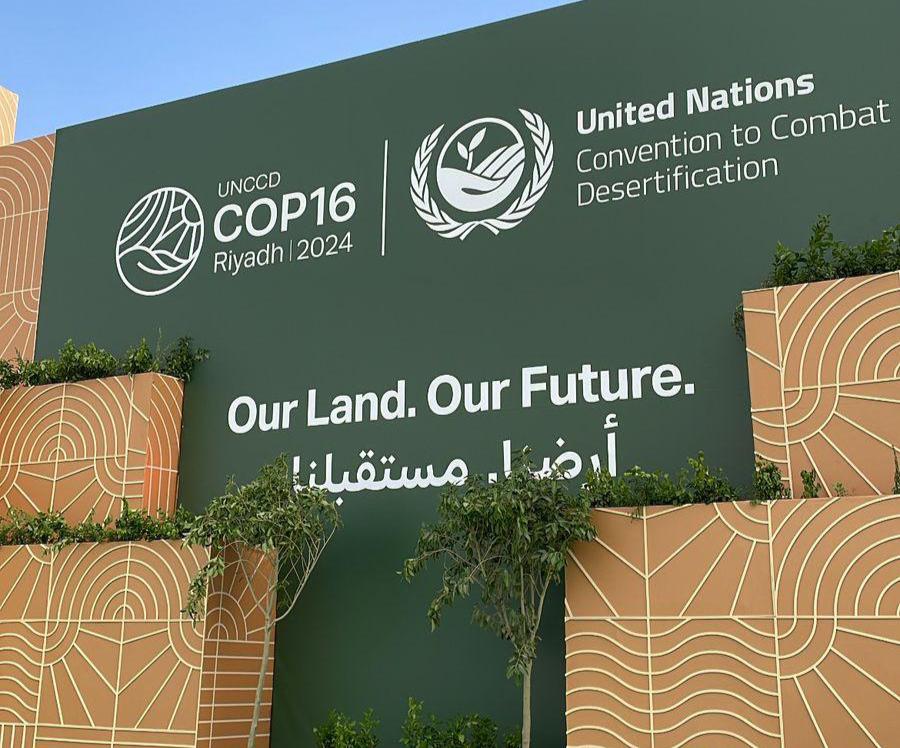
COP16 in Riyadh marked the final segment of this year’s marathon of negotiations under the three Rio Conventions (UNCCD, UNFCCC, and CBD). As the last conference in this pivotal series, COP16 faced the familiar challenges of multilateral environmental negotiations: balancing national interests with the urgent need for collective action.
The challenge of multilateral negotiations
Discussions on terminology and funding mechanisms once again proved contentious, as seen in the highly debated negotiations around the drought protocol. Despite extensive deliberations, negotiations stalled on several critical issues, reflecting how geopolitical dynamics and realpolitik can often overshadow the urgency for progress. These challenges highlight a fundamental tension in multilateral frameworks: navigating diverging national priorities while building collective, transformative action under the UNCCD framework.
Land tenure and synergies: A highlight amid broader achievements
Concerns about losing momentum on land tenure progress have been a recurring theme since the landmark decision at COP14. For TMG Research, these decisions have been pivotal, forming the foundation of our work to monitor their implementation in six countries (read our new report "Securing Land Tenure Rights to Achieve Land Degradation Neutrality"). Against this backdrop, the Land Tenure Decision at COP16 stands out as a significant achievement, demonstrating both continuity and ambition.
The new decision reinforces the importance of local-level solutions while emphasizing enhanced national coordination and implementation of previous decisions. The new provision to nominate land tenure focal points, while framed very cautiously, represents an unprecedented and also unique opportunity within the UNCCD process. These focal points have the potential to act as champions for land tenure, integrating it into restoration efforts and decision-making frameworks. The decision also underscores the need for deeper national and subnational engagement to ensure that land tenure is embedded into restoration plans, land-use planning, and broader governance processes. Further, the new decision calls for data-driven approaches to inform land-use policies and to design and implement effective land tenure administration systems.
However, it is crucial to view this decision within the broader context of COP16’s outcomes. Other decisions addressed enhancing synergies across the Rio Conventions, advancing migration-related actions, and strengthening scientific integration.
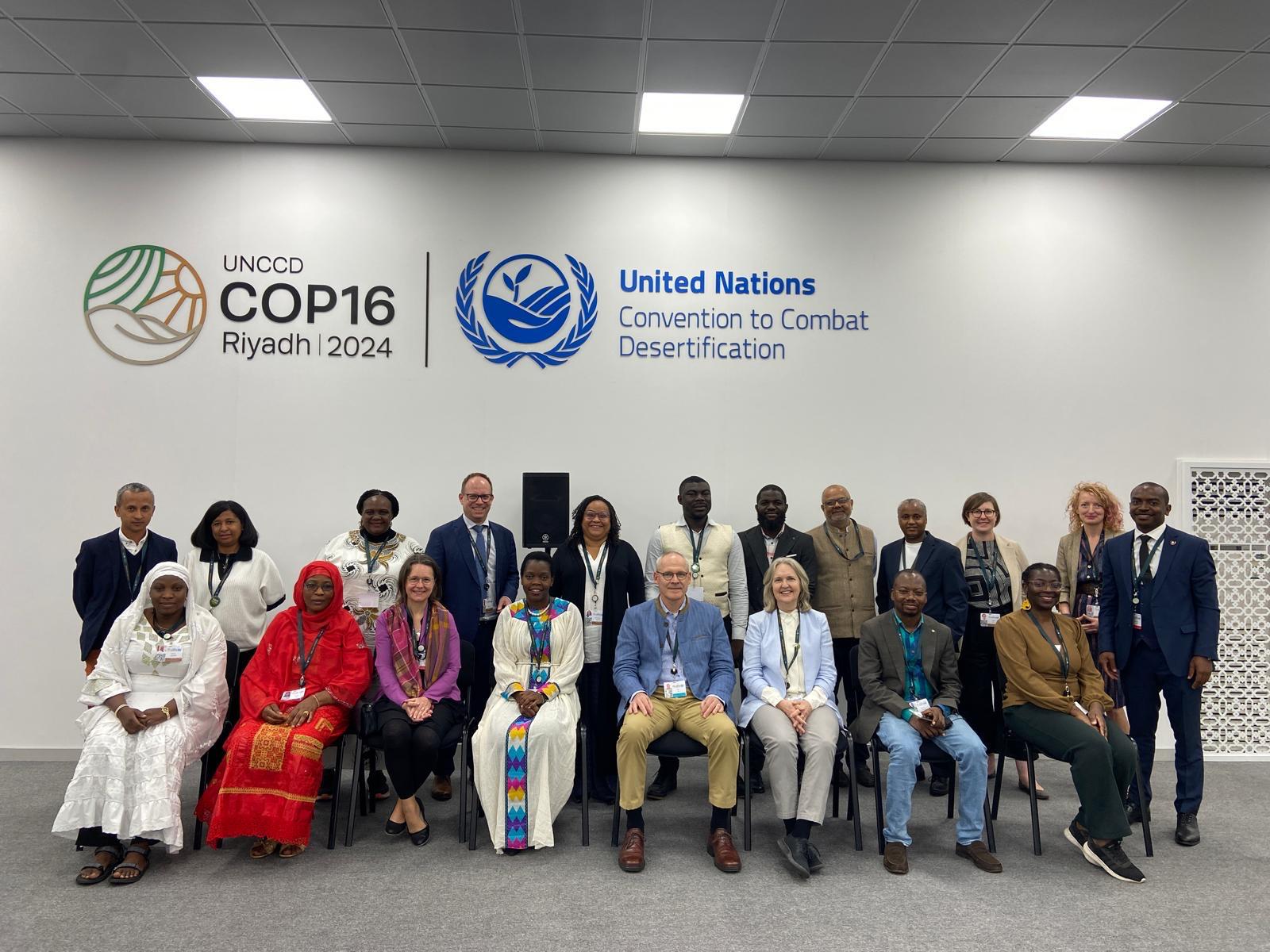
Civil society as drivers of inclusive governance
Globally, the shrinking space for civil society organization participation poses a significant challenge to inclusive and effective environmental governance. Within the UNCCD framework, CSOs play a vital role in connecting global commitments to grassroots realities, fostering trust, accountability, and equity in land governance.
Over the past two years, more than 400 new NGOs have been accredited to the UNCCD, joining nearly 700 already recognized. This surge in participation reflects not only the growing interest in the UNCCD’s mission but also the recognized urgency of engaging CSOs in efforts to achieve land degradation neutrality. However, greater efforts are needed to ensure these organizations are fully integrated into participation mechanisms and prepared to contribute meaningfully to key milestones like COPs (read our new info brief "Strengthening social participation in the UNCCD"). Awareness-raising and capacity-building will be essential to empower CSOs to influence governance strategies and translate global commitments into local action.
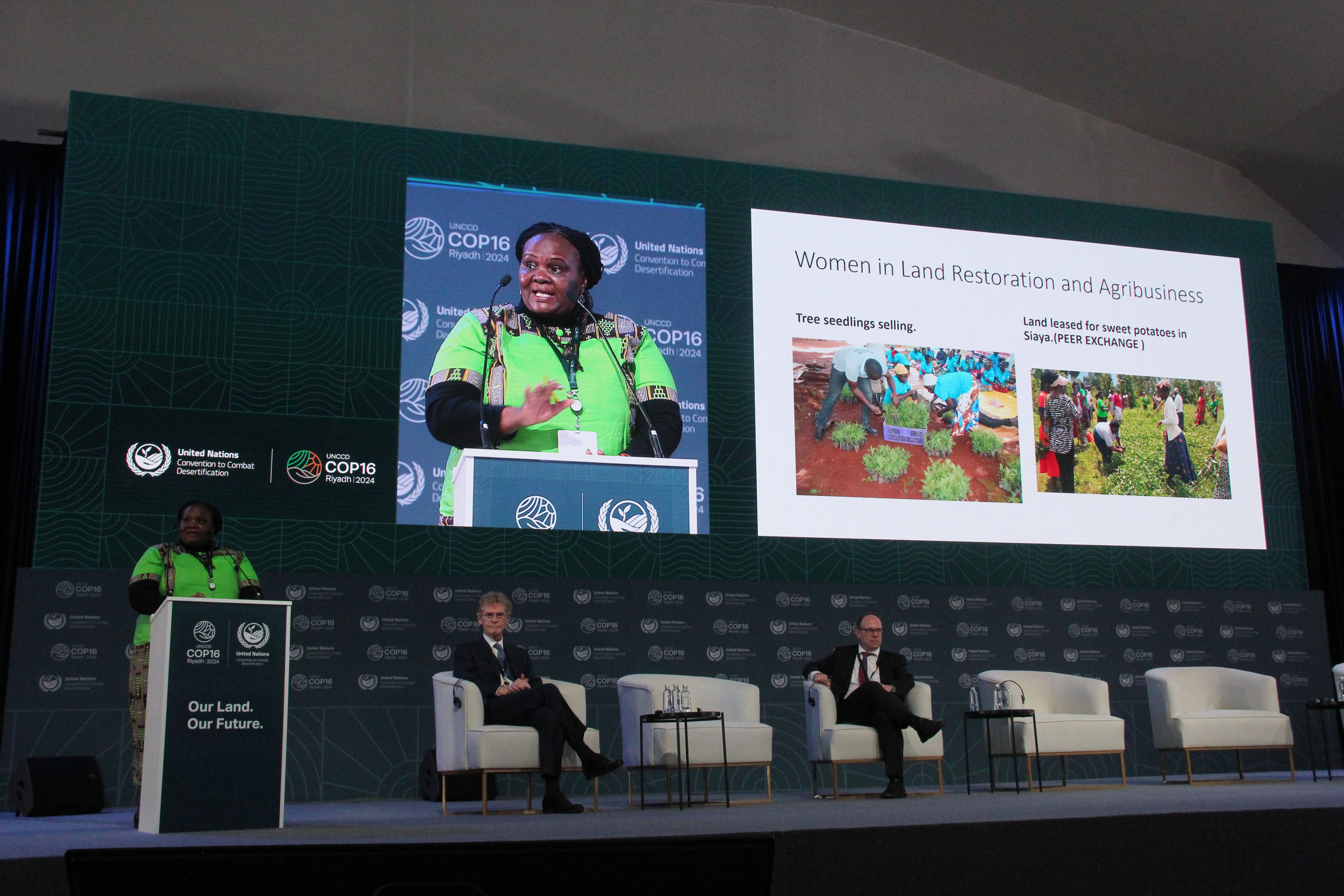
Women’s land rights and climate resilience
A central theme at COP16 was the urgent need to advance gender-responsive approaches to combat desertification and promote sustainable land restoration. Women are indispensable to these efforts, yet systemic barriers—such as unequal access to land, limited decision-making power, and insufficient recognition of tenure rights—continue to constrain their contributions.
The decision on gender underscores the importance of addressing these structural challenges, emphasizing the need for collaboration across the Rio Conventions and with international organizations. It highlights the importance of advocating for the recognition and expansion of women’s land rights and building on the momentum of recent workshops focused on leveraging synergies between the conventions.
The Women’s Land Rights Initiative (WLRI), launched in 2023, exemplifies this collaborative approach. By bringing together partners from across the political spectrum, the WLRI fosters innovative strategies to strengthen women’s land rights within the frameworks of the three Rio Conventions, ensuring gender equity is integrated into global restoration and climate resilience efforts (watch our latest video here). This is further highlights in HerLand, a flagship COP16 publication (see publication on the WLRI here and one our women's land rights reporting tool here).
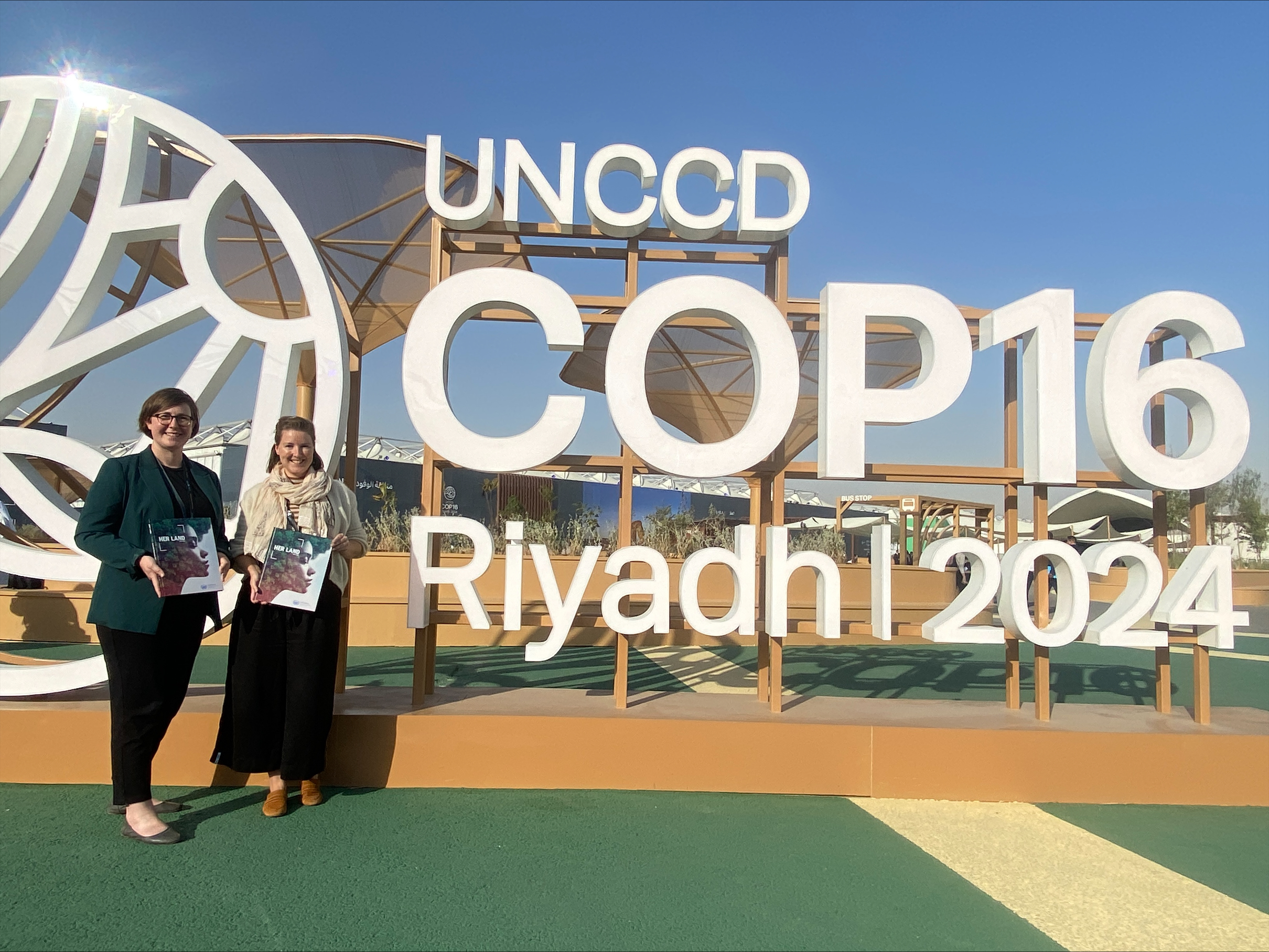
Looking ahead: the evolving role of the UNCCD
As the only multilateral environmental agreement focused exclusively on land, the UNCCD is uniquely positioned to address the interconnected challenges of desertification, land degradation, and drought within the broader context of climate change and biodiversity loss. COP16 highlighted the convention’s capacity to tackle issues such as land tenure, gender equity, and cross-sectoral synergies. Moving forward, the UNCCD must further strengthen its role to foster synergies by deepening its focus on land governance as a pillar of climate resilience, enhancing collaboration with the UNFCCC and CBD to align land-based actions with global climate and biodiversity targets, and expanding its scope to emerging issues like migration, urbanization, and food systems. Finally, the UNCCD must continue to serve as a champion for grassroots engagement and equity. By amplifying the voices of marginalized communities, particularly women, Indigenous Peoples, and smallholder farmers, the convention can ensure that global frameworks translate into tangible outcomes on the ground, but also that grassroots voices are anchored in decision-making processes.
TMG’s work at COP16, with six side events organised across the above topics (see further information here), reflects a commitment to bridging these gaps, advancing equitable governance, and amplifying grassroots voices. Moving forward, the challenge is not only to maintain momentum but to turn commitments into action—ensuring that the promise of COP16 becomes a reality for communities around the world.
Follow us over the coming weeks for in-depth analyses of the key decisions and their implications for identifying effective solutions.
We sincerely thank the German Federal Ministry for Economic Cooperation and Development (BMZ) and the Robert Bosch Stiftung (RBSG) for their financial support in making the above side events possible.
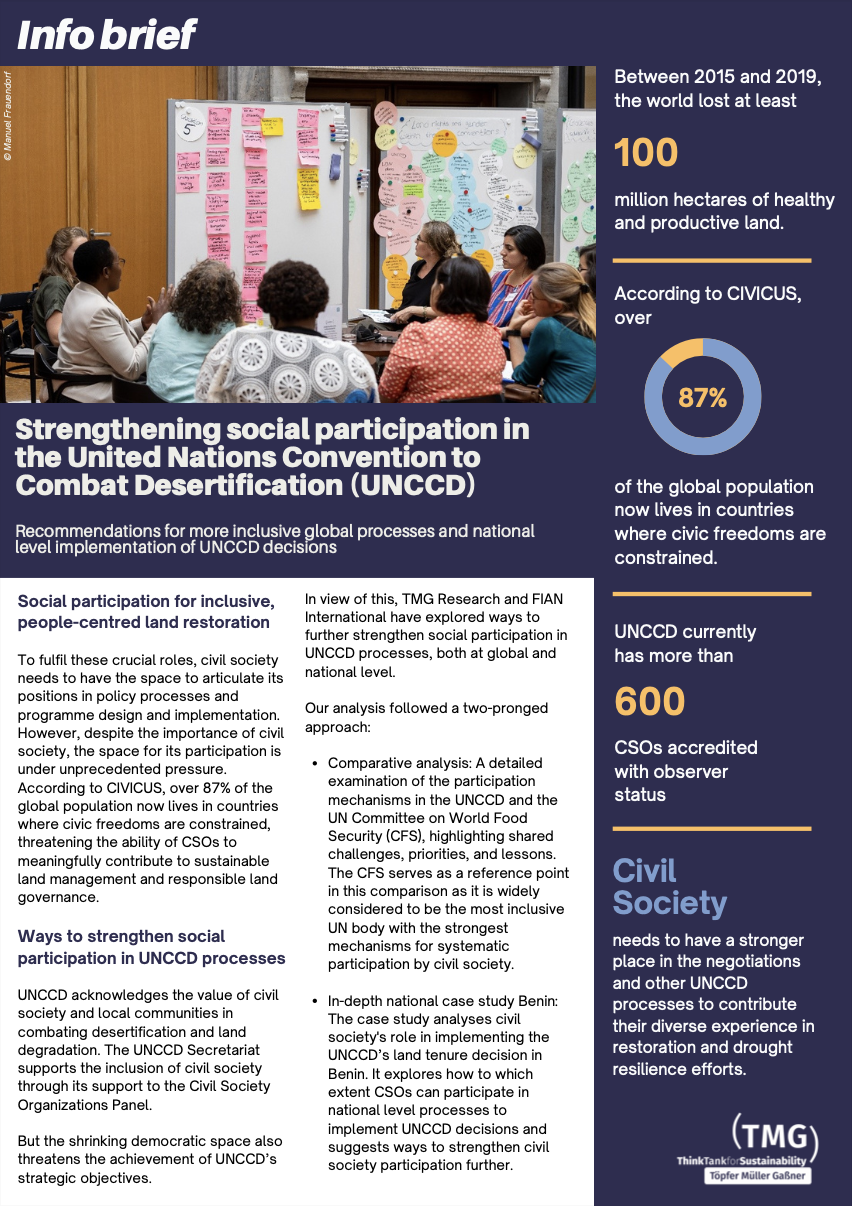
Info Brief
Strengthening social participation in the United Nations Convention to Combat Desertification
Strengthening civil society participation is key for inclusive governance and effective land restoration outcomes. COP16 can advance civil society participation in UNCCD processes and foster consensus for reform, and momentum must carry into COP17.
Written by Frederike Klümper
Published on Dec 10, 2024
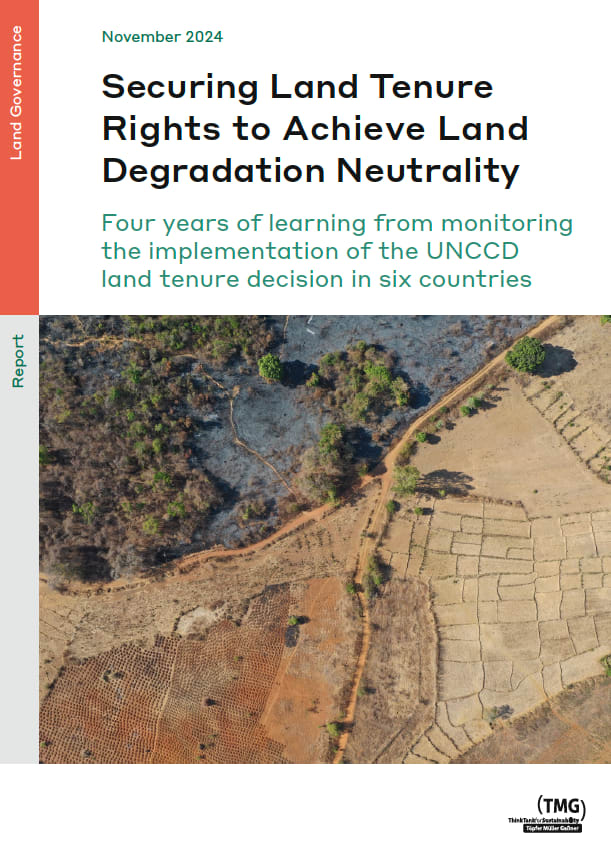
Report
Securing Land Tenure Rights to Achieve Land Degradation Neutrality
Four years of learning from monitoring the implementation of the UNCCD land tenure decision in six countries.
Written by Land Governance Team
Published on Dec 04, 2024
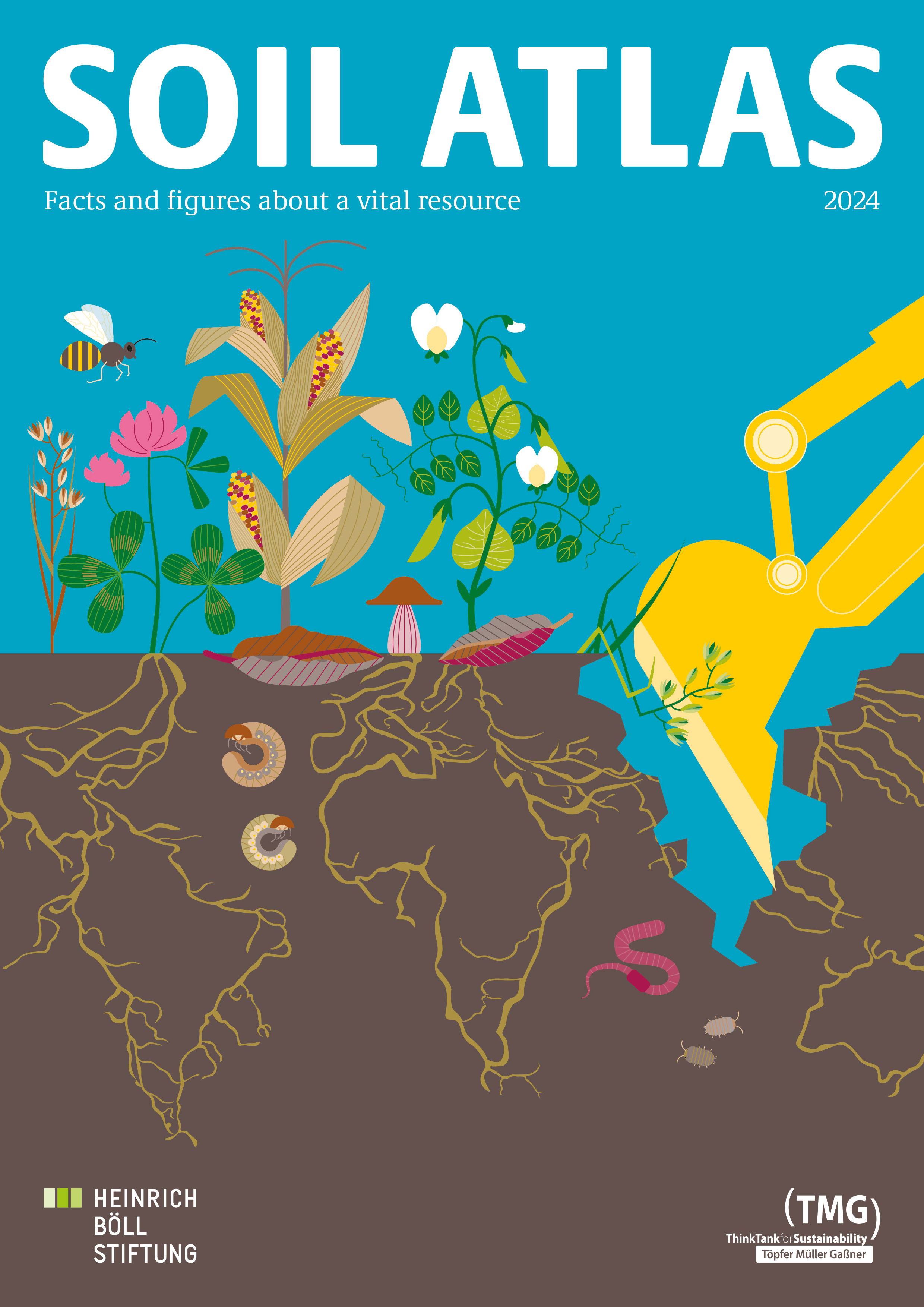
Report
SOIL ATLAS 2024 Facts and figures about a vital resource
The Soil Atlas 2024 presents facts and figures on the importance and condition of land, soils and arable land. In numerous graphics and text contributions, it provides an up-to-date insight into the condition of and threats to the soils on which we live.
Written by Heinrich-Böll-Stiftung, TMG Research gGmbH
Published on Nov 12, 2024
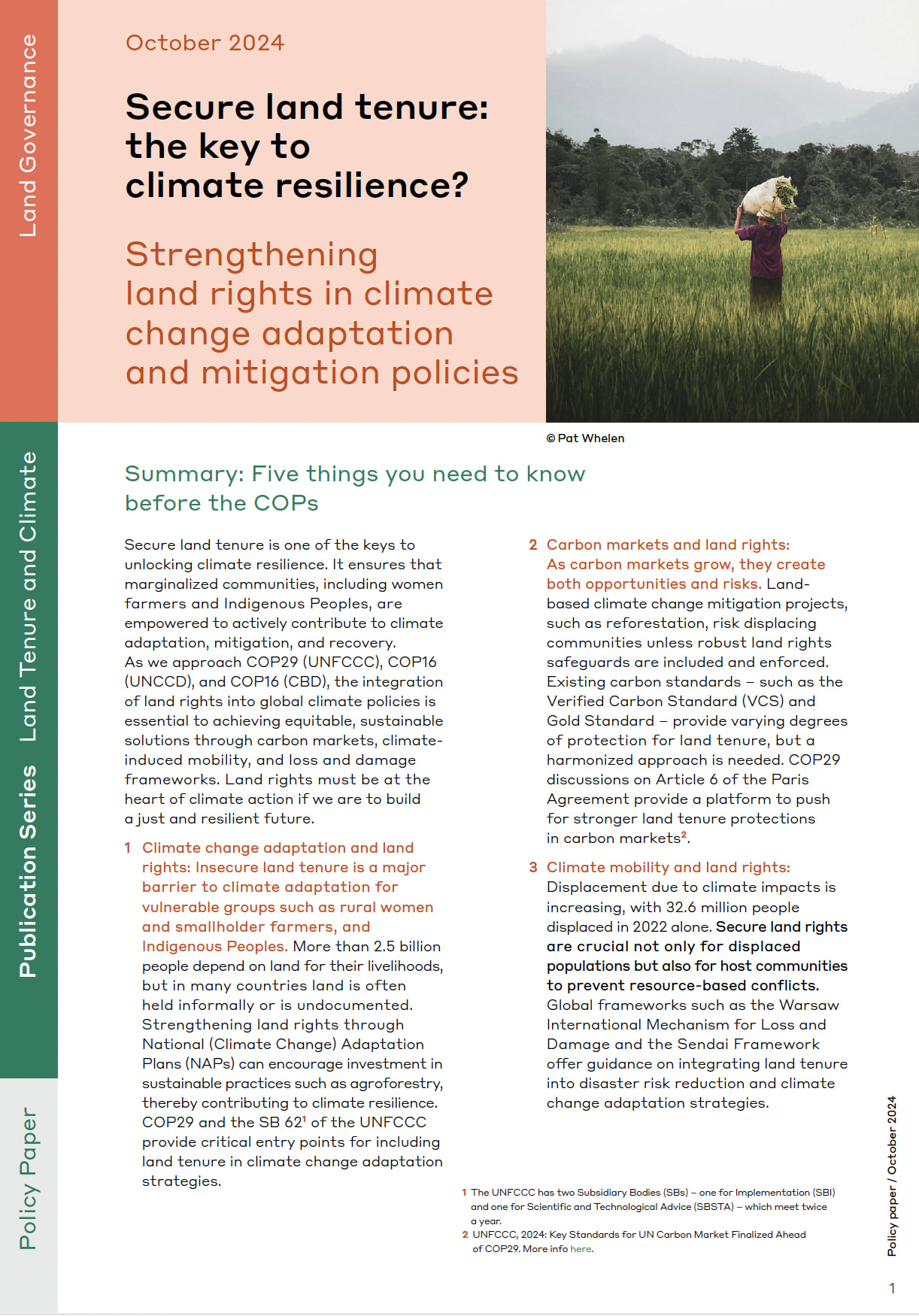
Policy Brief
Secure land tenure: the key to climate resilience? Strengthening land rights in climate change adaptation and mitigation policies.
This policy paper argues for the integration of land rights into global and national climate policies.
Written by Land Governance Team
Published on Oct 31, 2024

Report
Land Rights: A Powerful Foundation for Climate Action and Justice
This discussion paper analyses the various linkages between land rights and climate action.
Written by Land Governance Team
Published on Oct 30, 2024
 Land GovernanceDec 18, 2025
Land GovernanceDec 18, 2025Land tenure, women’s land rights, and resilience: Reflections from CRIC23 toward UNCCD COP17
Our experts discuss what the exchanges at CRIC23 highlighted and revealed about the role of secure and gender-equitable land tenure in the UNCCD's work ahead of the 2026 triple COP year.
Frederike Klümper, Washe Kazungu
 Urban Food FuturesDec 09, 2025
Urban Food FuturesDec 09, 2025The story of Mukuru's Urban Nutrition Hub
In Mukuru informal settlement, a safe haven for women has grown into the Urban Nutrition Hub, a multi-purpose space for nutrition education, training, and community development, demonstrating the potential of grassroots community-owned innovation..
Serah Kiragu-Wissler
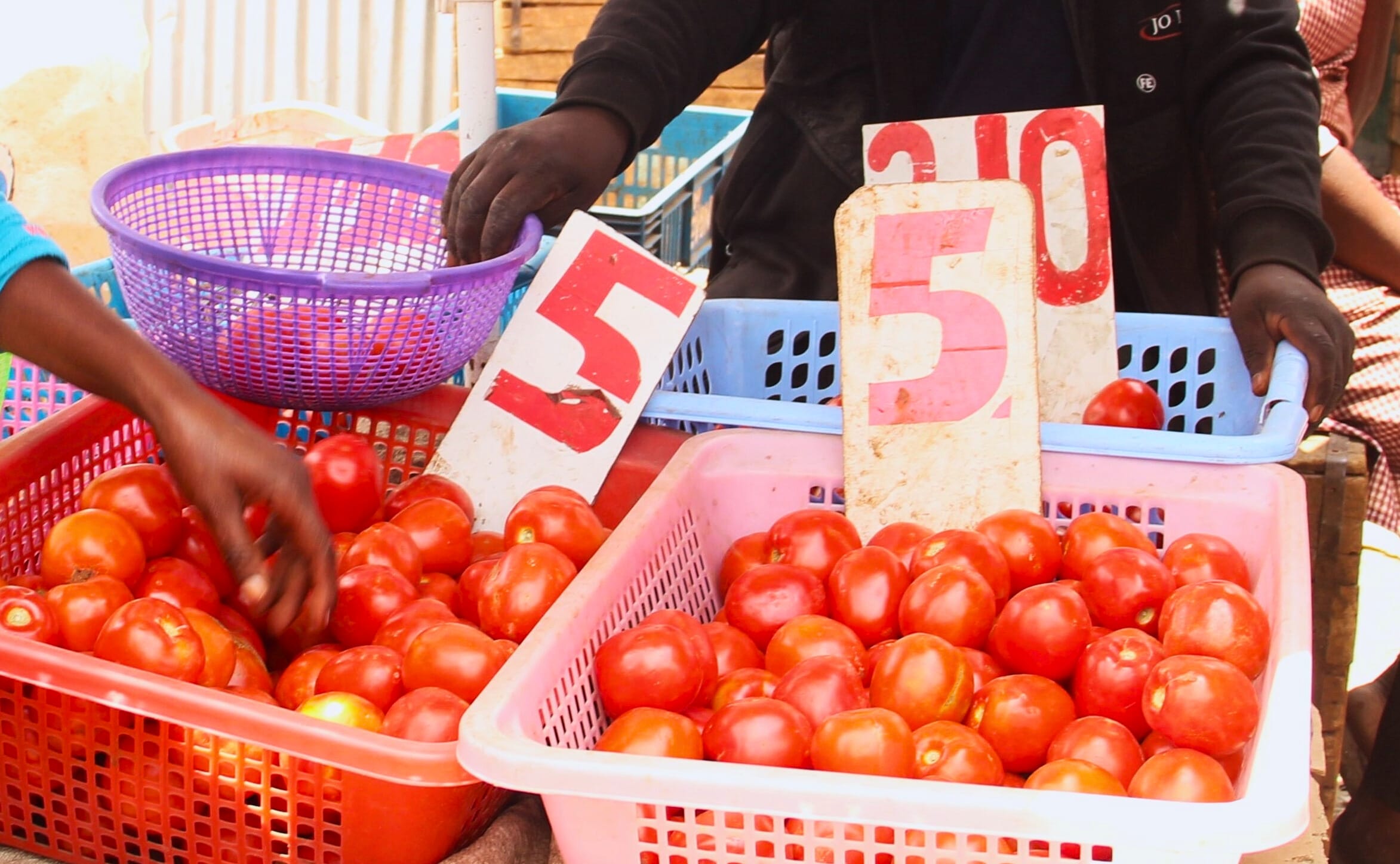 Urban Food FuturesSep 29, 2025
Urban Food FuturesSep 29, 2025Cheaper food, higher costs: The paradox of Nairobi’s food systems
What are the hidden costs of foods sold in Nairobi's informal markets, and who must bear them? We discuss how the city could build food systems that are both affordable and fair—for consumers and the people who feed them.
Christian Sonntag, Emmanuel Atamba, Lumi Youm

